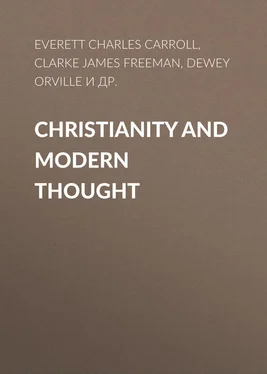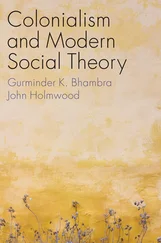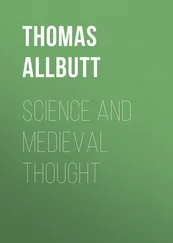Andrew Peabody - Christianity and Modern Thought
Здесь есть возможность читать онлайн «Andrew Peabody - Christianity and Modern Thought» — ознакомительный отрывок электронной книги совершенно бесплатно, а после прочтения отрывка купить полную версию. В некоторых случаях можно слушать аудио, скачать через торрент в формате fb2 и присутствует краткое содержание. Жанр: foreign_antique, foreign_prose, на английском языке. Описание произведения, (предисловие) а так же отзывы посетителей доступны на портале библиотеки ЛибКат.
- Название:Christianity and Modern Thought
- Автор:
- Жанр:
- Год:неизвестен
- ISBN:нет данных
- Рейтинг книги:5 / 5. Голосов: 1
-
Избранное:Добавить в избранное
- Отзывы:
-
Ваша оценка:
- 100
- 1
- 2
- 3
- 4
- 5
Christianity and Modern Thought: краткое содержание, описание и аннотация
Предлагаем к чтению аннотацию, описание, краткое содержание или предисловие (зависит от того, что написал сам автор книги «Christianity and Modern Thought»). Если вы не нашли необходимую информацию о книге — напишите в комментариях, мы постараемся отыскать её.
Christianity and Modern Thought — читать онлайн ознакомительный отрывок
Ниже представлен текст книги, разбитый по страницам. Система сохранения места последней прочитанной страницы, позволяет с удобством читать онлайн бесплатно книгу «Christianity and Modern Thought», без необходимости каждый раз заново искать на чём Вы остановились. Поставьте закладку, и сможете в любой момент перейти на страницу, на которой закончили чтение.
Интервал:
Закладка:
The positive institutions of Christianity decline in one form, to spring into new life in other and better forms. Doubtless, fourfold more money is expended to-day upon temples of worship than in what have been falsely called the ages of faith, – rather the ages of acquiescence. Religion does not decline as a costly interest of humanity with the progress of doubt, freedom, intelligence, science, and economic development. It is a permanent and eternal want of man, and is always present, either as a vast, overshadowing superstition, or as a more or less intelligent faith. Nowhere has it a stronger hold on society than in free America, which false prophets, with their faces to the past, muttered was about to become its grave. This busy, delving, utilitarian country, without a past, denied the influence of ruins and the memory of mythic founders, a land without mystery or poetry, – how could so tender and venerable a sentiment as reverence live in its garish day? how so sweet a nymph as Piety kneel in its muddy marts of trade, or chant her prayers in its monotonous wilderness, ringing with the woodman's axe or the screeching saw? But now delegates of all the great religious bodies in the Old World are visiting America, for religious instruction and inspiration. Nowhere, it is confessed, is there to be found a people so generally interested in religion, ready to make so great sacrifices for it, or so deeply convinced that its principles and inspirations are at the root of all national prosperity. Nowhere do churches and chapels spring up with such rapidity, and in such numbers; nowhere is the ministry as well supported, or its ministers as influential members of society; nowhere do plain men of business and intelligence, I do not say of science and philosophy, participate so freely in religious worship. And since all political compulsion has been taken off from the support of religion, and it has been made purely voluntary, its interests have received even more care. There is little doubt that the decline of religious establishments, the decay of priestly authority, the complete withdrawal of governmental patronage, the discrediting of the principle of irrational fear, the dispersion of false dogmas, the clearing up of superstition, the growth of toleration and charity, instead of weakening true faith or lessening public worship, will greatly increase and strengthen both. For it is not man's ignorance, weakness, and fears, that lead him most certainly to Christian worship and faith. There is a worship and a faith of blindness and dread; but they have no tendency to develop a moral and spiritual sense of the character of God, or the character becoming man, or to survive the spread of general intelligence and mental courage. If thought, if courage of mind, if inquiry and investigation, if experience and learning and comprehensive grasp, if light and sound reason, and acquaintance with human nature, tended to abolish a living God from the heart and faith of man, to disprove the essential truths of Christianity, or to make life and the human soul less sacred, aspiring, and religious, the world would be on its rapid way to atheism. But I maintain that science itself, philosophy and free inquiry, however divorced from religious institutions and dogmas, were never so humble, reverential, and Christian as since they partly emancipated themselves from theological or ecclesiastical censure and suspicion. For ages science knelt to religion as she went to her crucible or laboratory, like the sexton passing the altar in a Catholic cathedral, and with as little thought or feeling as he, simply to avert censure, while she pursued inquiries she knew would banish the superstition she pretended to honor. Faith and knowledge were at opposite poles; religious truth and scientific truth, finally and permanently amenable to different standards. How dishonoring to religion was this distrust of light and knowledge! how faithless in God, this faith in him which could not bear investigation! how compromising to Christianity, the sort of trust which refuses as blasphemous the application of all the tests and proofs which are required in the certification of every other important conviction! Religious faith rests on the spiritual nature; but its basis is not less real for being undemonstrable, like the axioms of mathematics. That is not real faith which dares not investigate the grounds of its own being. It is irreverent to God, to affirm that he does not allow us to try his ways; to demand proofs of his existence and righteous government; to ask for the credentials of his alleged messengers; to doubt until we are rationally convinced. If the artificial feeling that faith is opposed to reason; religious truth to universal truth; that belief in unseen things is less rational or less capable of verification than the radical beliefs of the senses, – if these prejudices were sound, or not the reverse of true, the world would be on its inevitable way to universal infidelity and godless materialism. But is that the tendency of things? Is it that religion is growing less mystic? or only science more so? Have not real and affecting mysteries been very much transferred for the time from theology to philosophy, from the priest to the professor? I doubt very much whether men of science are not more truly on their knees than men of superstition, in our days. Never did such candor, such confessions of baffled insight, such a sense of inscrutable wisdom and power, such a feeling of awe and dependence, seem to prevail in science as now, when so many theologians are raising the eyebrow, and seeking to alarm the world at what they call the atheism of the most truth-loving, earnest, and noble men. I would sooner have the scepticism – reverent and honest and fearless – of these solemn and awed inquisitors in the inner shrines of nature, than the faith of self-bandaged priests, who are thinking to light the way to heaven with candles on the mid-day altar, or to keep faith in God alive only by processions in vestments of purple and gold.
Nor has Christianity any thing permanently to fear from the disposition which now so largely prevails, to separate it from its accidents, its accretions, and its misrepresentations. The days have not long gone by when men were counted as entitled to little respect, if they did not wear side-swords and bag-wigs. You recollect how our Benjamin Franklin surprised, shocked, and then delighted all Europe, by appearing at the court of France in plain citizen's clothes? Religion, too, has had her court-dress, and her sounding court-titles, and official robes, and circuitous ceremonies. The world has felt horror-stricken whenever any brave and more believing spirit has ventured to ask the meaning of one of these theological tags and titles. But how much less wholesome is living water, if drunk out of a leaf, or the palm of one's hand, than if presented on a salver, in a curiously jewelled flagon, by a priest in livery? How much has theological ingenuity of statement and systematic divinity, which it takes the study of a life to understand, added to the power of the simplicity of Christ as he unfolds himself in the Sermon on the Mount? Yet, if any one has dared to be as simple as Christ himself was in his own faith, he has been said to deny the Lord that bought him. It has been called infidelity, to think Christ meant only just what he said, and was understood to say, in his simple parables. You must believe something not less incredible and abstruse than the church Trinity; something not less contrary to natural justice and common sense than the church vicarious atonement; something not less cruel and vindictive than the eternal misery of all who through ignorance, birth, or accident, or even perversity and pride, do not hear of, or do not accept, the blood of Christ as their only hope of God's mercy and forgiveness, or you are no Christian. Now I hold these dogmas themselves to be unchristian in origin and influence, although held by many excellent Christian men. I believe that they are the main obstacles with many honest, brave, and enlightened men in our day, to their interest in public worship; and that millions repudiate the Church, and Christianity, which is a different thing, simply because they suppose her to be responsible for these barnacles upon the sacred ship. It would be just as reasonable to hold the Hudson River responsible for the filth the sewers of the city empty into it; or to hold the sun answerable for the changes in its beams, caused by the colored glass in church-windows.
Читать дальшеИнтервал:
Закладка:
Похожие книги на «Christianity and Modern Thought»
Представляем Вашему вниманию похожие книги на «Christianity and Modern Thought» списком для выбора. Мы отобрали схожую по названию и смыслу литературу в надежде предоставить читателям больше вариантов отыскать новые, интересные, ещё непрочитанные произведения.
Обсуждение, отзывы о книге «Christianity and Modern Thought» и просто собственные мнения читателей. Оставьте ваши комментарии, напишите, что Вы думаете о произведении, его смысле или главных героях. Укажите что конкретно понравилось, а что нет, и почему Вы так считаете.












